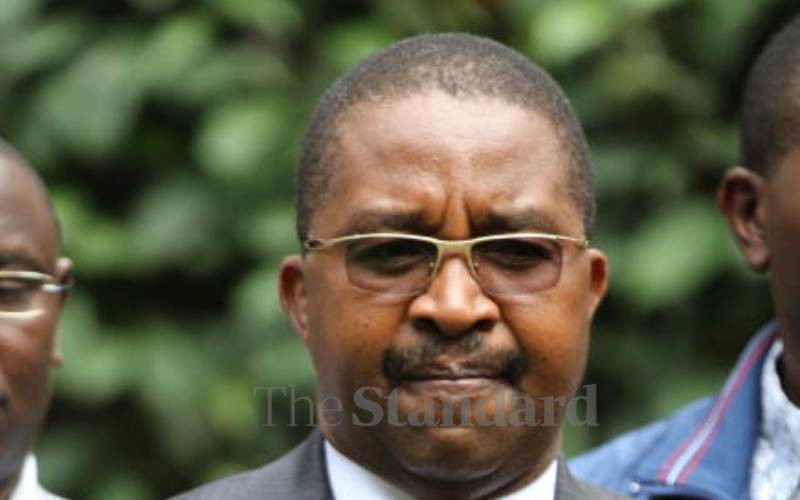In his New Year’s address 15 years ago, retired President Daniel arap Moi broke the hearts of many Kenyans when he expressed reservations about capping lending rates.
It was an unanticipated move, considering the popularity of the proposed amendments to the law sponsored by former Gem legislator Joe Donde.
“One clause of that Bill contradicts the Central Bank Act. For this reason, I will not give assent for the passage of the Bill into law until the anomaly is rectified by Parliament,” President Moi said in the first few minutes of 2001.
In another 10 days, the President sent to Parliament his written objection, including recommendations on several clauses that were in conflict with the Central Bank Act.
Existing loans would also not be affected by the proposal to cap rates, while the Monetary Policy Committee (MPC) could only provide an advisory role to the Central Bank of Kenya (CBK), rather than policy formulation as envisaged by Mr Donde.
In the end, minimal changes to the banking law were enacted and commercial banks emerged victorious — but not before intensive lobbying.
Moi took counsel from other institutions, including the World Bank and the International Monetary Fund — two of the most important sources of donor aid, but also the loudest advocates of market-determined lending rates.
In their counter arguments, MPs said commercial banks were operating in an oligopolistic structure, where a few dominant players were colluding to charge huge interest rates to the peril of the population.
In refusing to sign the amendments into law, Moi was seen to have gone against the popular stand, as banks had long been viewed as public enemies, with cases of foreclosures being commonplace.
Similar position
Today, President Uhuru Kenyatta finds himself in a similar position after a Bill like Donde’s sailed through Parliament without a single objection.
Mr Kenyatta, unlike Moi in 2001, is seeking re-election in 12 months, and the sentiment from Parliament is that this is the people’s Bill. It will, therefore, be a tough balancing act and he has said he is consulting widely.
Last Thursday, MPs defied strong lobbying from commercial banks to unanimously pass amendments seeking to regulate deposit and lending rates. The Bill’s sponsor, Kiambu MP Jude Njomo, is pushing for both deposit and lending rates to be tied to a benchmark rate defined by the MPC, while prescribing punitive penalties for bank officials who violate the guidelines.
The Banking (Amendment) Bill, 2015, provides that banks shall not charge interest rates above 4 per cent of the Central Bank Rate, which is a policy instrument used by the CBK to communicate if banks should lend more or less.
“A person shall not enter into an agreement or arrangement to borrow or lend directly or indirectly at an interest rate in excess of that approved by law. A bank or financial institution that contravenes the provision commits an offence and shall be liable to a fine of not less than Sh1 million,” reads the Bill in part.
Stay informed. Subscribe to our newsletter
It is one of few laws that has passed through Parliament with no resistance, though in this particular case, legislators are among Kenya’s larger borrowers.
But a real battle to block the amendments is simmering outside Parliament. Banking executives have been jolted into action, warning that regulating interest rates is disastrous for the economy.
Investors will flee the country and take with them valued foreign currency, the banks’ lobby cautioned within hours of the passage of the amendments.
Wrong medication
NIC Group CEO John Gachora said the move was “absolutely the wrong medication” to the high interest rate regime. He is also the vice chairman of the Kenya Bankers Association.
“We must have a relook at this,” he said in his plea to Uhuru to reject the amendments like Moi before him.
And the banks have a critical backer in CBK Governor Patrick Njoroge, an ex-IMF economist.
Dr Njoroge has repeatedly cautioned that regulating interest rates would be bad for the economy, but so are the high interest rates levied by commercial banks.
Unjustifiably high interest rates are stifling economic growth, the CBK boss said in a recent interview.
Should the President approve the amendments, lending rates will be slashed by almost half to 14.5 per cent, while the savings rates will rise three-fold to 7.35 per cent.
It might, however, be premature to celebrate, going by the precedence set with the Donde Bill, and an attempt that followed it in 2015 that was sponsored by Gem MP Jakoyo Midiwo but was thrown out of Parliament.
[email protected]
 The Standard Group Plc is a
multi-media organization with investments in media platforms spanning newspaper
print operations, television, radio broadcasting, digital and online services. The
Standard Group is recognized as a leading multi-media house in Kenya with a key
influence in matters of national and international interest.
The Standard Group Plc is a
multi-media organization with investments in media platforms spanning newspaper
print operations, television, radio broadcasting, digital and online services. The
Standard Group is recognized as a leading multi-media house in Kenya with a key
influence in matters of national and international interest.
 The Standard Group Plc is a
multi-media organization with investments in media platforms spanning newspaper
print operations, television, radio broadcasting, digital and online services. The
Standard Group is recognized as a leading multi-media house in Kenya with a key
influence in matters of national and international interest.
The Standard Group Plc is a
multi-media organization with investments in media platforms spanning newspaper
print operations, television, radio broadcasting, digital and online services. The
Standard Group is recognized as a leading multi-media house in Kenya with a key
influence in matters of national and international interest.









